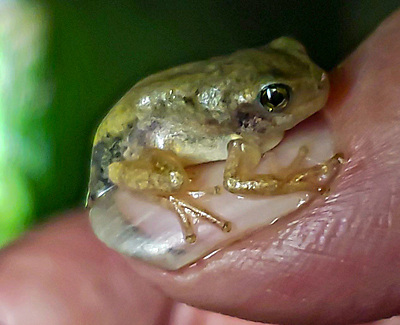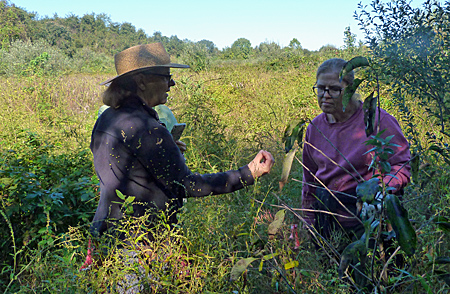What’s Happening at JK Black Oak
The Sanctuary provides a location to bring together several core elements of Loudoun Wildlife Conservancy’s mission: habitat restoration, citizen science and education. To protect the environmentally sensitive habitat and rare species, JK Black Oak Wildlife Sanctuary is not open for general public access.
Habitat Restoration
Except for a 16-acre patch of mature oak-hickory forest, most of JK Black Oak is highly disturbed old pasture in various stages of succession, ranging from meadows to young, scrubby forests of pioneer tree species. Many of the vernal pools on the property were grazed, or otherwise highly disturbed. Invasive plants had degraded much of the habitat throughout JK Black Oak. Addressing these issues and restoring healthy habitat is the goal of the monthly work days that take place April through December. (See our dedicated volunteers at work.) In the fall of 2022, Loudoun Wildlife received a generous grant from Microsoft in partnership with the Society for Ecological Restoration that enables us to begin addressing the damage caused by White-tailed Deer to the oak-hickory forest. Learn more about some of our habitat restoration projects: planting and protecting trees, restoring the western meadow and clearing trash from a vernal pool.
Amphibian and Reptile Monitoring

Gray Treefrog froglet, just emerged from life underwater.
Photo by Jenny Erickson
In March 2021, Loudoun Wildlife Conservancy started the first year of a continuing population survey of the amphibians living and breeding in and around the vernal pools of JK Black Oak. This ongoing survey will allow us to monitor the amphibians and track fluctuations in their numbers. To date, the herpetology survey team has recorded four species of reptiles and 11 species of amphibians, including the elusive Eastern Spadefoot. We were able to closely monitor the rarely-observed breeding behaviors and monitored the developing spadefoots, collecting data that added to the overall knowledge of this species. We will continue to survey the property and hope to add new species to our list. In addition, we will continue to monitor the healthy spadefoot population at JK Black Oak to learn more about their life habits and behaviors. We will also be closely monitoring the Eastern Box Turtle population by identifying individuals and recording their movements. The overall population of Eastern Box Turtles are on the decline, so gathering information about local populations can help us work toward sustaining healthy populations as a whole.
Bat Monitoring
The Banshee Reeks chapter of Virginia Master Naturalists has launched a decade-long project to identify bats that visit and live in the area from recordings of their bat echolocation calls. Thirteen recording stations have been deployed around Loudoun County including one at JK Black Oak. Recordings are made when bats are active in the area from April through October. Data collected during the 2022 season identified nine species of bats, including the endangered Northern Long-eared Bat, that are present at JK Black Oak.
Stream Monitoring
A small, unnamed stream flows along the eastern border of JK Black Oak, and two monitoring sites were established in the stream in May 2021. Excessive E. coli bacterial contamination was measured in the lower segments of the stream and led to Loudoun Wildlife receiving a grant to support efforts to secure clean drinking water for the Lucketts community. Loudoun Wildlife’s Stream Team continues to collect baseline data on the health of the stream by conducting macro surveys and chemical tests at both sites semiannually. Learn more about the upstream and downstream monitoring sites.

Identifying plants in the eastern meadow.
Photo by SA Ferguson
Native Plant Surveys
A small team of native plant enthusiasts has been conducting informal native plant surveys on the property since 2020 and recording their observations in the JK Black Oak Wildlife Sanctuary project in iNaturalist. In 2021 and 2022, efforts were focused on identifying meadow species to determine which natives needed to be relocated ahead of the wetlands mitigation project that is now planned for 2024. Over 60 species of native annuals and perennials have been documented in the meadows, and more will undoubtedly be found. Surveys in 2023 focused on the oak-hickory forest to provide data for forest restoration projects.
Insect Surveys
In the summer of 2023, the first three insect surveys were conducted at JK Black Oak. Of the 115 species recorded, 50 have have been identified to species. (You can see these observations in the JK Black Oak Wildlife Sanctuary project.) Surveys will begin again in 2024 with the expectation of finding many more insects.
Nature Walks
Although JK Black Oak is not open to the public, Loudoun Wildlife holds a number of nature walks at the Sanctuary throughout the year focusing on birds, butterflies, dragonflies, amphibians and reptiles. All walks are listed in the online event calendar and anyone can sign up to attend the walks.
Our Work
Habitat Restoration News
-
Meadow Restoration Continues at JK Black Oak JK Black Oak’s western meadow has seen its share of...
Read More -
Planting a Woodland Edge Did you know that the transition zone at the edge...
Read More -
Volunteers Breathe New Life into Meadowscape Volume 29 Issue 1, Winter 2024 by Susan Abraham and...
Read More

